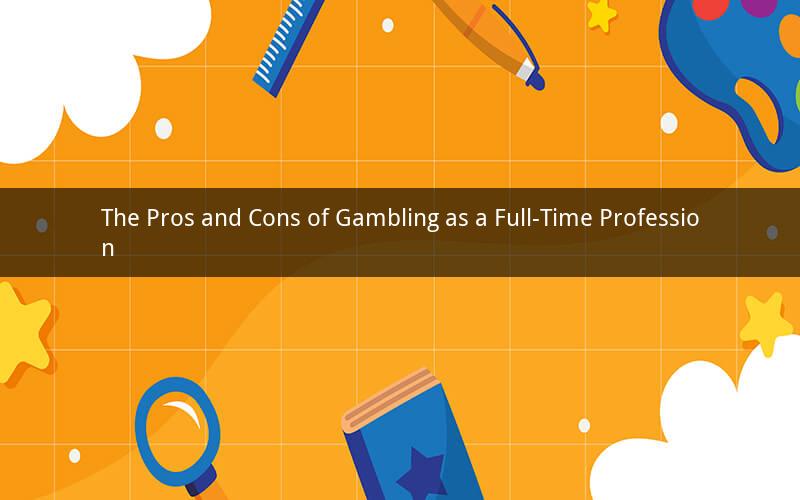
In recent years, the allure of turning gambling into a career has captivated many individuals. The promise of a life filled with thrill, excitement, and potentially high earnings has made people question, "Can I gamble for a living?" This article delves into the advantages and disadvantages of making a living through gambling, exploring various aspects such as the skills required, the risks involved, and the psychological impact.
Pros of Gambling as a Full-Time Profession
1. Financial Rewards: One of the most appealing aspects of gambling as a career is the potential for substantial financial gains. Successful gamblers can earn a substantial income by consistently winning bets and profiting from their expertise.
2. Autonomy: Gambling as a full-time profession offers a high degree of autonomy. Gamblers can choose when and where to play, allowing for a flexible work-life balance. This can be particularly beneficial for individuals who value independence and the freedom to make their own decisions.
3. Entertainment: For many, gambling is a form of entertainment. By turning it into a profession, individuals can enjoy their passion while also earning a living. This can make the workday more enjoyable and engaging.
4. Skill Development: Successful gambling requires a combination of knowledge, strategy, and discipline. By pursuing a career in gambling, individuals can develop valuable skills such as analytical thinking, decision-making, and risk management.
Cons of Gambling as a Full-Time Profession
1. High Risk of Loss: The most significant drawback of gambling as a profession is the risk of losing money. Unlike traditional careers, gambling is inherently unpredictable, and even the most skilled gamblers can experience losing streaks.
2. Psychological Impact: The pressure to win can lead to psychological issues such as anxiety, depression, and addiction. The constant need to perform and the fear of failure can take a toll on a person's mental health.
3. Limited Opportunities: While there are professional gamblers who have achieved success, the number of individuals who can make a living through gambling is relatively small. The competition is fierce, and only a select few have the talent, luck, and perseverance to succeed.
4. Legal and Ethical Concerns: In some regions, gambling is illegal or heavily regulated. Gamblers must navigate these laws to avoid legal repercussions. Additionally, the ethical implications of gambling as a profession, such as the potential for addiction and the exploitation of others, cannot be overlooked.
5. Social Impact: A career in gambling can impact one's social life. The need to spend long hours gambling and the potential for addiction can strain relationships with friends and family.
Frequently Asked Questions
1. What skills are required to be a successful professional gambler?
A successful professional gambler must possess a combination of knowledge about the game, analytical thinking, discipline, and the ability to manage risk effectively.
2. Can anyone become a professional gambler?
While anyone can try to become a professional gambler, the likelihood of success is relatively low. It requires a unique combination of talent, luck, and perseverance.
3. How can I reduce the risk of losing money while gambling?
To reduce the risk of losing money, it's essential to have a solid understanding of the game, develop a sound strategy, and set strict budget and time limits.
4. Are there any legal risks associated with gambling as a profession?
Yes, there are legal risks associated with gambling as a profession, especially in regions with strict gambling regulations. Gamblers must ensure they are operating within the legal boundaries of their jurisdiction.
5. Can gambling be a sustainable career choice?
While gambling can be a lucrative career choice for a select few, it is not a sustainable option for most individuals. The high risk of loss, potential for addiction, and the competitive nature of the industry make it a challenging profession to pursue long-term.